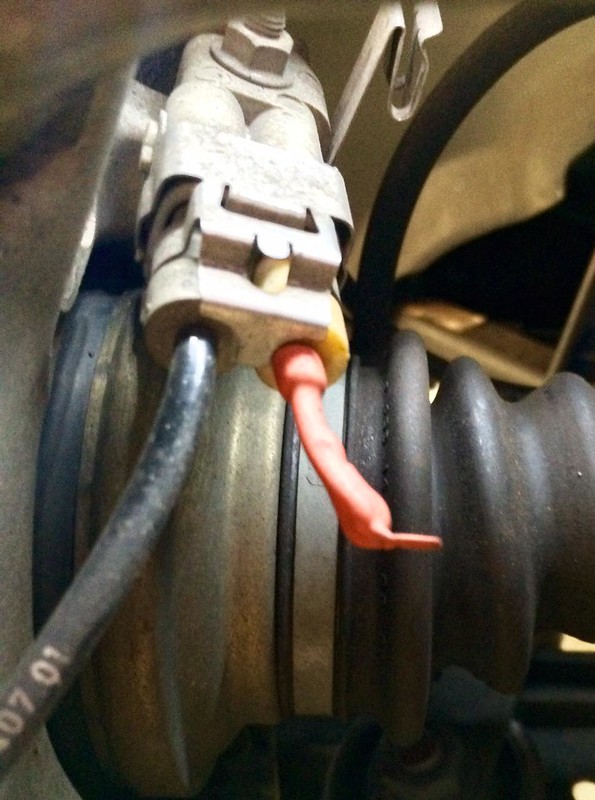
Home
>
Main Forum
>
Topic Well..... |  |  |
| re-using brake wear sensors boxsterd - 7 years ago |
| Maybe ... *NM* Pedro (Odessa, FL) - 7 years ago |
Pedro Bonilla
1998 Boxster 986 - 311,000+ miles: [www.PedrosGarage.com]
PCA National Club Racing Scrutineer - PCA National HPDE Instructor - PCA Technical Committee (Boxster/Cayman)
Racecar spelled backwards is Racecar
"Racing is life. Anything before or after is just waiting" ... Steve McQueen as Michael Delaney in "LeMans"
"If you wait, all that happens is that you get older"... Mario Andretti
"Being second is to be the first of the ones who lose" ... Ayrton Senna
1998 Boxster 986 - 311,000+ miles: [www.PedrosGarage.com]
PCA National Club Racing Scrutineer - PCA National HPDE Instructor - PCA Technical Committee (Boxster/Cayman)
Racecar spelled backwards is Racecar
"Racing is life. Anything before or after is just waiting" ... Steve McQueen as Michael Delaney in "LeMans"
"If you wait, all that happens is that you get older"... Mario Andretti
"Being second is to be the first of the ones who lose" ... Ayrton Senna
| Well..... Bruce In Philly (2000 S Boxster, now '09 C2S) - 7 years ago |
They are cutting..... so why would you not have a set on hand when you did your work. If you see they are bad, now what? You are already deep into the job. What is going to tip your decision? The insulation will be cut.... just get new ones and don't worry.
The big question for me was the expensive Porsche labeled parts or the cheap off-brands. Some said the less expensive ones can melt.
Anyone with experience here?
Peace
Bruce in Philly
The big question for me was the expensive Porsche labeled parts or the cheap off-brands. Some said the less expensive ones can melt.
Anyone with experience here?
Peace
Bruce in Philly
Burg Boxster - 7 years ago |
you're going to monitor pad wear/thickness w/ frequency (as should be done)... you can eliminate need for sensors all together. Simply cut each lead up near plug and short them out (just twisting bare wires together, either solder or use a crimp terminal and then heat shrink tube to seal them from elements) thus removing and replacement worries. Your savings should promptly be applied to garage beer fund (preferably mine) 

Good luck
"Cool Prius!"
-Nobody


Good luck

"Cool Prius!"
-Nobody
| Like Pedro said: Maybe. I reused sensors that had... MarcW - 7 years ago |
been worn down to enough to trigger the brake warning light. I just figured as long I I could install the sensor so the bare section was not against the brake pad backing plate it would be ok. Since the portion of the sensor that had made contact with the rotor was was facing the opposite direction, towards the rotor, this wasn't a real struggle to get the sensor positioned properly. I assumed there was a chance the sensor might rotate (though how I had no idea) and might trigger a false wear warning light but I figured I'd worry about that when if it happened.
In my case it never did.
Before that I'd just replace the sensors along with the other brake hardware when I did the brakes. I tried the tie the sensors up thing but got tired of explaining why every time I had the car in for service the sensors were tied up. Next time I did the brakes I used the sensors like God and Porsche intended and since then I have not reused the old ones.
In my case it never did.
Before that I'd just replace the sensors along with the other brake hardware when I did the brakes. I tried the tie the sensors up thing but got tired of explaining why every time I had the car in for service the sensors were tied up. Next time I did the brakes I used the sensors like God and Porsche intended and since then I have not reused the old ones.
Quote
Bruce In Philly (2000 S Boxster, now '09 C2S)
Quote
MarcW
I used the sensors like God ...... intended and since then I have not reused the old ones.
Where do I get His manual? Quite a few differing ones out there I am told.
Peace
Bruce in Philly
Cost me $300 and I received 64lbs of Boxster factory manuals. It is typical though that manufacturers recommend/advise all brake hardware should be replaced when doing the brakes. My auto tech buddies also urged me to replace all the brake hardware. 'course this was back in the day when drum brakes were common if only on the rear wheels and a failed drum brake spring -- and there were about a zillion of these in the drum -- could take out the drum or worse.
For disc brakes this includes pads, and most often (nowadays) rotors, and any fasteners associated with replacing the rotors -- caliper bolts -- and the hardware that holds the pads in place. In the case of the Boxster the spring retainer, the pin that holds the retainer in place, and the spring clip that holds the pin in place. For some of my vehicles I'd replace the wheel bearings (and seals) too as these were exposed when I removed the hub with the rotor.
It has been a few years since I've done the brakes on my Boxster but when I did I recall Porsche offered a brake hardware kit (with enough hardware to do either the front brakes or the rear brakes) that includes everything but the caliper bolts and the sensors. The bolts have to be ordered separately as do the sensors.
cotter (R) pin, retaining bolt, spring metal thing-y
That said i've done dozens of brake jobs, some track-side, and have never ever bought one.
I do sand and oil the pin. R-clips are available at my hardware store for about 35 cents.
I also clean the pistons - first with a hose before dis-assembly, and then with old brake fluid and a toothbrush, and push them all the way in and then extend them twice, to make sure they move freely.
Grant
Grant
gee-lenahan-at-gee-mail-dot-com
That said i've done dozens of brake jobs, some track-side, and have never ever bought one.
I do sand and oil the pin. R-clips are available at my hardware store for about 35 cents.
I also clean the pistons - first with a hose before dis-assembly, and then with old brake fluid and a toothbrush, and push them all the way in and then extend them twice, to make sure they move freely.
Grant
Grant
gee-lenahan-at-gee-mail-dot-com
Quote
grant
cotter (R) pin, retaining bolt, spring metal thing-y
That said i've done dozens of brake jobs, some track-side, and have never ever bought one.
I do sand and oil the pin. R-clips are available at my hardware store for about 35 cents.
I also clean the pistons - first with a hose before dis-assembly, and then with old brake fluid and a toothbrush, and push them all the way in and then extend them twice, to make sure they move freely.
Grant
Well, do you see the problem with this? Sand the pin? Sand with what? How much? What finish? And so on? Then oil? The oil just attracts the abrasive particles so this become a lapping compound between the pin and the holes of the caliper. So now the easily/expensively replaceable pin becomes the instrument of destruction of the holes that are part of the expensive/hard to replace caliper.
And I guess you believe all "R-clips" are the same and appropriate to use in a safety critical system like the car's brakes?
| Well, I am amazed at those who can just brush aside.. MarcW - 7 years ago |
what the manufacturer recommends for servicing something like brakes as being hardly important.
And while you might manage to avoid any issues if this type/level of brake of servicing -- and on a track car too which is even more amazing -- were to become widespread then the risk of some having issues increases.
I am not qualified to recommend someone deviate from what Porsche recommends which is why I try to adhere to recommending doing what Porsche says and when in a situation where my opinion might influence someone I know that I've done all I can to ensure the procedure, the repair, the service will be done with as little risk of a problem at the time or a problem arising afterwards.
And while you might manage to avoid any issues if this type/level of brake of servicing -- and on a track car too which is even more amazing -- were to become widespread then the risk of some having issues increases.
I am not qualified to recommend someone deviate from what Porsche recommends which is why I try to adhere to recommending doing what Porsche says and when in a situation where my opinion might influence someone I know that I've done all I can to ensure the procedure, the repair, the service will be done with as little risk of a problem at the time or a problem arising afterwards.
| Truthfully, i evaluate every Porsche recomendation in light of my own obervations, and data grant - 7 years ago |
.. and many of them don't hold much water.
Data to me is vastly more valuable than either a manufacturer's suggestion ( which, as one myself many times over, i know where many of them come from..) or theory - which is great, but when it conflicts with reality, theory loses.
The pin ( to simplify this discussion) merely holds a spring clip in place. Its pretty simple. My experience is that the main issue with it is rusting. This has two impacts, only one of which impacts safety while it is in o place.
1. it increases in diameter and cant fit through the hole in the caliper body. This makes removal difficult.
2. it has more friction on a part (spring clip) that should be free floating, contradicting its design intent
(anti seize helps here too - i figure if its doesn't get loktite, it gets anti-seize or lubrication - a part should either move or not)
A new pin solves problem #1 a little, btu not the problem of continued rust. Ditto problem #2.
A sanded pin returns more or less to original spec. A coating of oil prevents rust - so it maintains both dimension and function (allows the spring to move).
I offer this merely as explanation of the issues and my willingness to ignore porsche . (actually its often eagerness, their specs for things liek IMS bearings and center lock hubs have been catastrophes).
The real reason to follow my advice is data. It works. I -- and other track rats - have modestly large data samples that support our ways. regular owners who do a brake job every 5 years have vastly fewer. I'll also acknowledge that maybe there is a difference if it is left 5 years - that pin might be in awful condition. Mine, service and oiled regularly, are not. Typically, they are nearly new, save the dirt.
Have you tried both and come up with your own data? You have many good ideas that you share from experience. If so, id like to hear it.
Grant
Grant
gee-lenahan-at-gee-mail-dot-com
Data to me is vastly more valuable than either a manufacturer's suggestion ( which, as one myself many times over, i know where many of them come from..) or theory - which is great, but when it conflicts with reality, theory loses.
The pin ( to simplify this discussion) merely holds a spring clip in place. Its pretty simple. My experience is that the main issue with it is rusting. This has two impacts, only one of which impacts safety while it is in o place.
1. it increases in diameter and cant fit through the hole in the caliper body. This makes removal difficult.
2. it has more friction on a part (spring clip) that should be free floating, contradicting its design intent
(anti seize helps here too - i figure if its doesn't get loktite, it gets anti-seize or lubrication - a part should either move or not)
A new pin solves problem #1 a little, btu not the problem of continued rust. Ditto problem #2.
A sanded pin returns more or less to original spec. A coating of oil prevents rust - so it maintains both dimension and function (allows the spring to move).
I offer this merely as explanation of the issues and my willingness to ignore porsche . (actually its often eagerness, their specs for things liek IMS bearings and center lock hubs have been catastrophes).
The real reason to follow my advice is data. It works. I -- and other track rats - have modestly large data samples that support our ways. regular owners who do a brake job every 5 years have vastly fewer. I'll also acknowledge that maybe there is a difference if it is left 5 years - that pin might be in awful condition. Mine, service and oiled regularly, are not. Typically, they are nearly new, save the dirt.
Have you tried both and come up with your own data? You have many good ideas that you share from experience. If so, id like to hear it.
Grant
Grant
gee-lenahan-at-gee-mail-dot-com
Sorry, only registered users may post in this forum.


